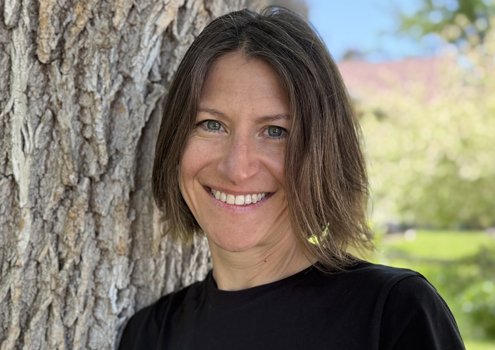Reading time: About 3 minutes
Kristi Spence strongly believes that writing is not linear. All writers have good days and bad days — and that’s the gig, she says. The writing doesn’t do itself.
Kristi Spence is a mom, learner, scientist, writer, runner and philosopher. In her weekly Substack newsletter, Noticing, she spends time exploring what’s around her giving thought to the often-overlooked.
I was excited to talk to Kristi about how she approaches writing.
Q. Roughly how much time do you spend writing every day?
I’m a bit all over the show! I try to spend at least an hour writing creatively each day, though the total time I spend writing varies between writing for work, journaling, writing my weekly Substack essay and working on a long-term creative project.
Q. What’s a simple activity or habit that makes you a better writer?
Oh, I have three things:
- Running and walking! My mind tends to wander in the best ways when I set out on a walk or run with a problem to solve. It’s like my subconscious takes over and leads me in directions I never expected. I often come home from a walk/run and need a quick download — either notes on my phone or an audio message — to capture my thinking.
- Writing with friends. I am currently taking a writing course, and we have a Zoom room that is always available to us. We have a What’sApp group, and fellow writers will often mention when they will be logging in to write. We keep cameras on and mics muted, but it provides a great accountability to know that we are in this together.
- Going to a coffee shop. I love dedicated time at a coffee shop to write. The atmosphere feels inspiring to me, and I often reward myself with a treat.
Q. What interferes with your writing?
Everything! I am currently moving, so packing is a great distraction. Just one more box, and then I’ll sit down to write. My kids, my dog, meals, text messages, emails, weeding…It is so easy to let anything and everything get in the way. My best writing time is early in the morning before anyone else in my house is awake.
Q. How do you persuade yourself to sit down to write on days when you really, really DON’T feel like doing it?
I give myself permission to free write, not solve any particular problem or write something profound. Just write. Sometimes I will literally type, “I don’t know what to write right now and I have no idea what to say…” And then I will keep going and see what comes up. Usually in this stream of nonsense, a seed of an idea will sprout, I will write to that and see what germinates.
Q. Is there a particular motto or saying that you’ve found helpful for writing?
I often write personal essays, and I appreciate this sentiment from Anne Lamott in Bird by Bird: “If something inside you is real, we will probably find it interesting, and it will probably be universal. So you must risk placing real emotion at the center of your work. Write straight into the emotional center of things. Write toward vulnerability. Don’t worry about appearing sentimental.”
Q. Which stage of the writing process do you enjoy the most: researching, writing or editing/rewriting and why?
I enjoy the part where I feel I’ve adequately captured what’s inside my head and articulated it in a relatable way. It’s like a sculptor who knows exactly what lies within the rock/wood/or marble and chips away the excess to reveal their vision to the world. Sometimes this comes easily in the writing phase, and other times it takes loads of edits and reworking.
Q. What’s one of the best books you’ve read (either fiction or non-) in the last five years?
Oh boy! I just wrote a piece on how hard it is for me to choose favorites, especially books, but I will pick two that are top of mind and stand out in different ways – one fiction, one non.
Cloud Cuckoo Land by Anthony Doerr. I absolutely LOVE the genius of this braided narrative.
Why Fish Don’t Exist by Lulu Miller. When I finished this book last year, here’s what I jotted down: So raw and honest. Part memoir, part science lesson, part philosophy.
Q. What book are you reading right now?
I am reading A Walk in the Park by Kevin Fedarko and Draft No. 4 by John McPhee.
Q. What do you think is the biggest misperception that new writers have about the act of writing?
I still feel like a new writer! But as I write more, I am learning two key lessons:
- Writing is not linear. You have good days and bad days, sometimes the writing is easy, sometimes it’s a slog and the words won’t come. All writers face this. It’s part of the gig, and you have to keep going through it all. The work doesn’t do itself.
- There is no one way that works for everyone. Find what works for you and then do that.


